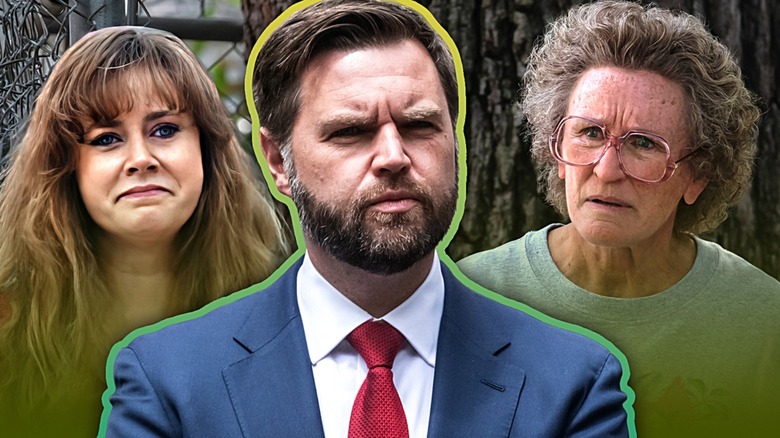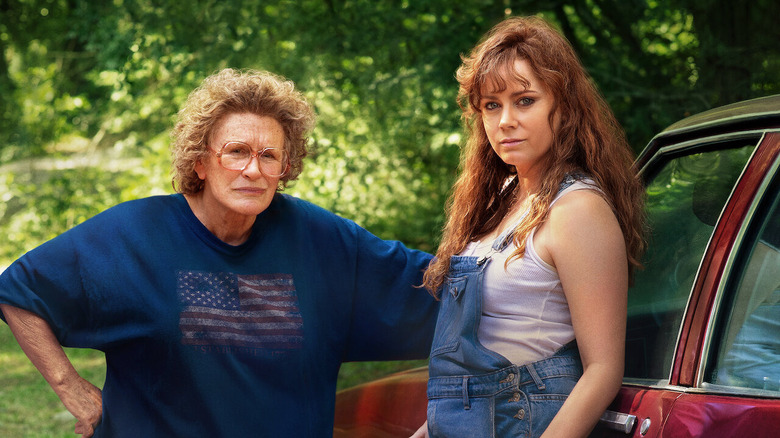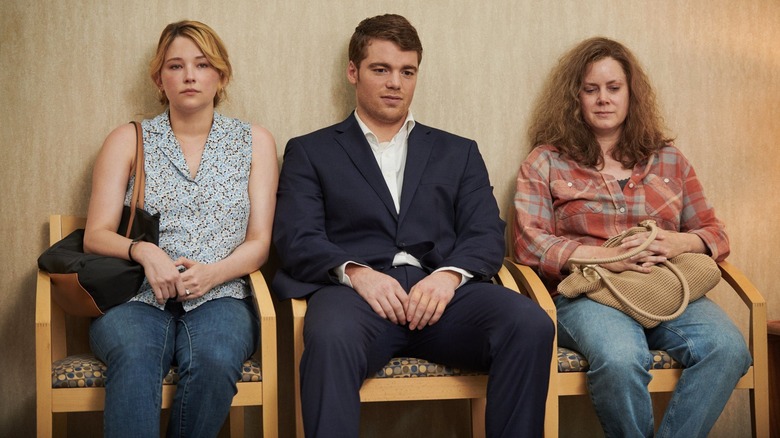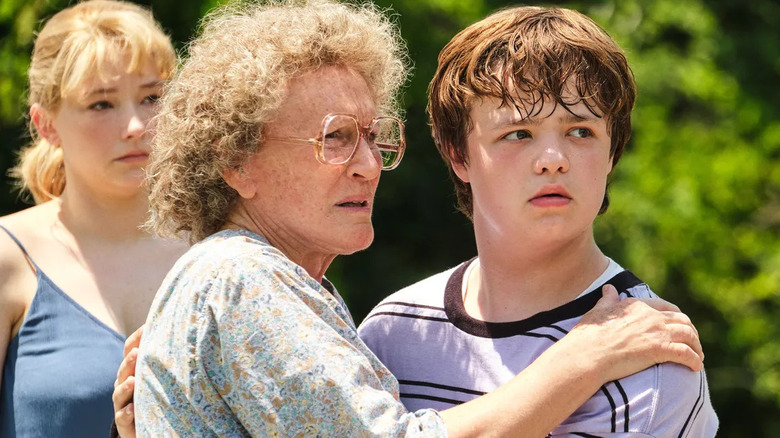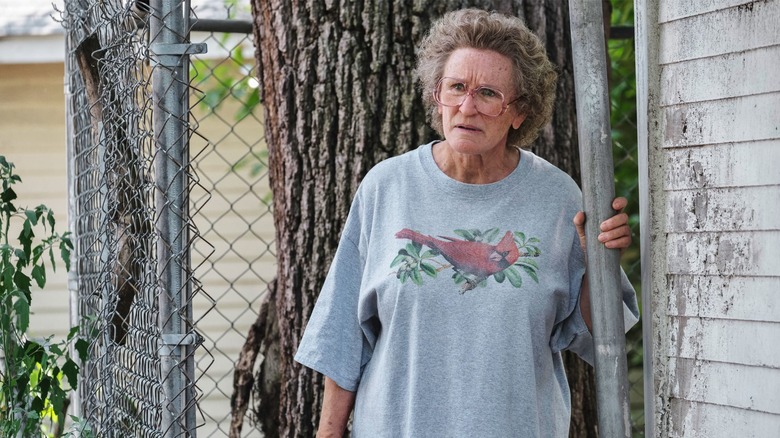What The Most Negative Critic Reviews Said About J. D. Vance's Hillbilly Elegy Movie
We may receive a commission on purchases made from links.
J.D. Vance's story is very inspiring. As his 2016 memoir, "Hillbilly Elegy: A Memoir of a Family and a Culture in Crisis," related, he was raised in abject poverty in the suburbs of Ohio by his Kentucky-born grandparents, and his mother wrestled with addiction all her life. He managed to rise out of poverty, serve a stint in the military, and was eventually accepted into Ohio State University. He eventually achieved a degree from Yale and now, at age 39, Vance has realized his ultimate goal: to be a whiny, sycophantic bootlicker for a clownish would-be fascist. In 2024, Vance will serve as the running mate of Donald Trump, and the pair hope to enact Project 2025, a piddling wish-list of evil, theocratic dictates that aims to rob women, the poor, and queer people of rights and turn the president into an Emperor. We've come a long way, baby.
Conservative critics praised "Hillbilly Elegy" for its Horatio Alger-like narrative of rising beyond rough circumstances to become educated and successful. Most critics, however, pointed to the book's irresponsible messaging, noting that Vance's opinions that poverty is caused by ill-defined "social rot" is brazenly linked to eugenics (!) and isn't based in any economic realities. Critics noted that Vance leans rather hard into the racist and false "welfare queen" rhetoric invented by Ronald Reagan back in the '80s.
In 2020, Ron Howard directed a film adaptation of "Hillbilly Elegy," and it, too, was panned roundly by critics for its risible dialogue, over-the-top melodrama, and laying bare the weakness of Vance's philosophy. It racked up a meager 25% approval rating on Rotten Tomatoes, and was largely dismissed by audiences. The reviews are almost as harsh as Vance's opinions on Trump in 2016. What integrity he has.
The reviews that radicalized J.D. Vance
In "Hillbilly," Gabriel Basso plays J.D. Vance and Owen Asztalos plays Vance as a teenager. Glenn Close plays Vance's down-country Mamaw, while Amy Adams plays his drug-addicted mother, Beverly. A lot of the film's drama surrounds Beverly's erratic behavior stemming from her intense addictions, and how Vance is torn between caring for himself and caring for his mom. Vance teeters on whether or not he's going to fall into vice and perpetual poverty, or get a leg up and emerge from his class.
Mamaw, a fan of "Terminator 2: Judgment Day," gives an embarrassing speech about how "Everyone in this world is one of three kinds: Good Terminator, a Bad Terminator, and Neutral." She encourages J.D. to be a Good Terminator. It was generally accepted that "Elegy" fetishized white poverty to an embarrassing degree, and many felt that, however true the story may be, every aspect of the film and of Vance's memoir felt artificial and inauthentic. The Escapist wrote an entire thinkpiece about how ill-thought-out the "Terminator" speech was.
Several critics called "Hillbilly Elegy" the worst film of the year, including David Sims, writing for the Atlantic. He felt that the characters were too broad and the thesis too vague, writing
"This movie could've succeeded as a story about human beings, not cartoons. 'Hillbilly Elegy' is, after all, about real people who are still alive; they are named in the end credits and shown in photographs [...] But Howard's film is nothing more than a sensational snapshot, one that feels even less authentic than many of the think pieces that followed the release of Vance's book in 2016. To Hollywood, J. D. is just another cookie-cutter hero, one who's defeated the haziest of villains: adversity itself."
Yikes.
Hillbilly willy-nilly
Alissa Wilkinson, writing for Vox, was especially harsh, saying:
"Its writing feels vague and hazy, unacquainted with the world it's portraying, a collection of clichés stuffed into a two-hour slog. [...] I am surprised it's as bad as it is. [...] [I]t is distractingly Hollywoodified, a rich person's idea of what it is like to be a poor person, a tone-deaf attempt to assuage a very particular kind of liberal guilt by reifying the very thing that caused the guilt in the first place. And, perhaps worst of all, it's a very dull movie."
Wilkinson was especially incensed because she could relate to Vance's impoverished upbringing. She, too, went to expensive elite colleges after being raised in the sticks. She was careful to point out the incorrect assumptions and outright fabrications Howard's film layered onto poverty. She continued:
"It takes only a mild sniff to catch a strange whiff of the self-congratulatory. (Vance is one of the ones who got out, and as he tells it, that's because he made good choices.) And 'Hillbilly Elegy' is a strangely incurious book, purporting to explain various phenomena (like working-class white distrust of media, or his family's history of rampant domestic violence) without much in-depth exploration of the factors in play."
It's a film, it seems, that feints in the direction of philosophical profundity, but ends up being a sappy Hollywood plate of platitudes. There is nothing profound about "Hillbilly Elegy."
More negative reviews
Richard Brody, writing for the New Yorker, also noted the eerie disconnect within the film's politics. It purports to take a hard look at impoverished white people, but has no interest in examining its own politics. "Elegy," Brody wrote, oversimplifies major American issues, and falls in an unsavory place:
"The movie's vision of America is one of "nothing" except self-interest and self-improvement; it's one in which the only reach beyond the self is the one that embraces family, in which pleasure is a distraction and a danger, and culture is a fraud and a lure. With his soupy, impersonal manipulations of memory and experience, void of the burrs that attach them to the world at large, Howard, whether intentionally or not, has made a libertarian's fantasy."
Howard may not have known, but Vance was explicit.
Darren Franich, writing for Entertainment Weekly, gave the film an F, pointing out that Vance leaves out the actual parts of his own struggle. The story centers on Vance's curious braggadocio, as if he made the film to brag about his ability to get into Yale, rather than analyze the difficult parts of his journey. As Franich noted:
"Humanity: That's one thing missing from 'Hillbilly Elegy,' and it's missing entirely. Actual triumphs of spirit are hacked to pieces or left out. At one point, young J.D. gets good at Algebra, ditches his nameless go-nowhere friends, and finds a part-time job — all in a brisk montage. Closing chyrons explain that Bev got clean. Would've been interesting to see that, but then we might've missed J.D.'s own achievements. There's an eerie myopia here, really, generations of trauma sacrificed at the altar of one man's professional success."
It's all ego.
Did negative reviews actually radicalize J.D. Vance?
A.O. Scott, writing for the New York Times, noticed that the thesis of Howard's "Hillbilly Elegy," cribbed directly from Vance's original book, was that poverty is not the result of politics or systems, but of culture. He even finds sociological precedent, citing that "'Hillbilly Elegy' updates the old 'culture of poverty' thesis associated with the anthropologist Oscar Lewis's research on Mexican peasants (and later with Daniel Patrick Moynihan's ideas about Black Americans) and applies it to disadvantaged white communities." As he put it:
"[The film] sacrifices the intimacy, and the specificity, of those stories by pretending to link them to something bigger without providing a coherent sense of what that something might be. The Vances are presented as a representative family, but what exactly do they represent? A class? A culture? A place? A history? The louder they yell, the less you understand — about them or the world they inhabit."
We're just supposed to know.
In 2016, J.D. Vance hated Donald Trump. In 2024, he agreed to be Trump's running mate. What happened?
In 2022, the Washington Post ran an article about how Vance was radicalized to the fascist Right, and how the bad reviews of "Hillbilly Elegy" may have been responsible. Pushed away from mainstream fame, and with his feelings hurt, Vance fled the "elites" (read: working-class critics) and fell in the arms of the affluent Right Wing media machine:
"When the 'Hillbilly Elegy" movie came out on Netflix in 2020, it was not just critically panned but greeted with intense online mockery, and the tenuous cultural diplomacy achieved by the book seemed to unravel for good. [...] According to Vance's best friend from Yale, Jamil Jivani, the wounding commentary was the 'last straw' in his falling-out with elites."
My advice: next time, make a better movie.
